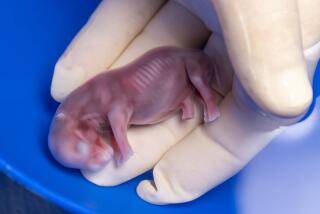Rare Ox Clone Gestated in Cow Dies Two Days After Birth
- Share via
DES MOINES — A cloned ox that gestated in the womb of a cow in a scientific first died of an ordinary disease this week, two days after it was born, scientists said Friday.
Scientists claimed bittersweet victory in the experiment, which used technology they hope can help shore up the numbers of endangered Asian gaur (pronounced “gower”).
The baby bull was born Monday at TransOva Genetics in Sioux Center, Iowa, and died of common dysentery Wednesday. The project united cloning with that of an interspecies birth.
Noah was believed to be the first animal to gestate in the womb of another species and survive through the late stages of fetal development.
“The data collected clearly indicates that cross-species cloning worked, and as a scientist, I’m pleased,” said Philip Damiani, a researcher with Advanced Cell Technology, a Worcester, Mass.-based company that sponsored the research.
A necropsy concluded that the gaur’s death was not a result of cloning or gestation in another species, said Robert Lanza, vice president of medical and scientific development at ACT.
To create Noah, scientists used a cell from a dead gaur implanted into a cow’s egg. They removed the DNA from the egg, ensuring that the interspecies pregnancy produced a gaur, not a gaur-cow mix, Damiani said.
ACT plans to try the gaur experiment again and also wants to clone an extinct Spanish mountain goat called the bucardo, native to the Pyrenees. The cells will be taken from the last bucardo, which died last year.
The gaur birth likely won’t bring a rush of scientists producing extinct and endangered species, said George Amato, director of the Science Resource Center at the Bronx Zoo in New York.
“It’s complicated, expensive and it doesn’t work all the time,” he said. “It’s not an answer to the extinction crisis.”
The procedure won’t resurrect the extinct dodo bird because scientists don’t have its genetic makeup. Other animals don’t have living surrogates that are suitable matches.
Grahame Bulfield, director of the Roslin Institute in England, which created the famous cloned sheep, Dolly, said he believes cloning will focus on improving existing species.





